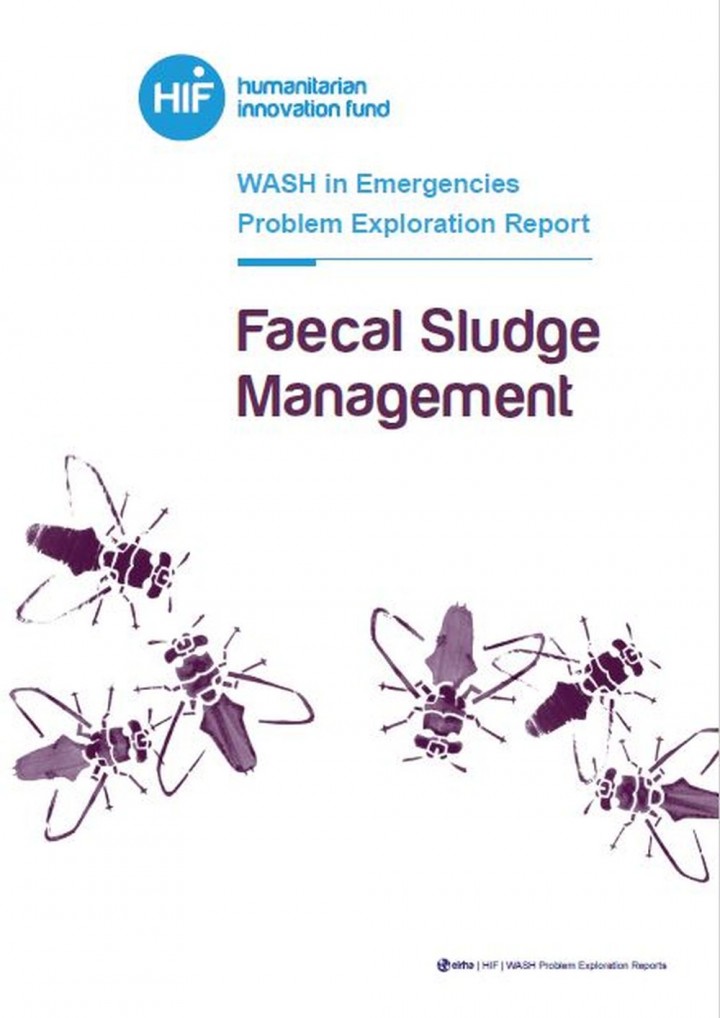
Published in: 2016
Pages: 44
Publisher:
HIF (Humanitarian Innovation Fund) Problem Exploration Report. Cardiff: ELRHA
Author:
Grange, C.
Uploaded by:
SuSanA Admin
Partner profile:
common upload
11477 Views
316 Downloads
During the immediate phase of an emergency in an urban context, the implementation of sanitation programmes takes a long time to provide suitable and sufficient facilities for the affected population.
While the emergency response for drinking water programmes has been improved with the design of standardised, rapid deployment kits, sanitation programmes in urban areas are limited to very few technologies. The construction of pit latrines and the implementation of hygiene promotion programmes are the main activities carried out by humanitarian actors to address the challenges of open-air defecation. If left unaddressed, this can lead to serious public health problems and spread dangerous diseases such as diarrhoea and cholera.
When deciding on key strategic factors such as the most appropriate number of toilets, the number of users per unit is essential. Sphere standards offer important guidance regarding these decisions. However, even if minimum standards are met the main challenge is that toilets, usually pit latrines, fill up very quickly and need to be emptied as soon as possible. Latrines that are not regularly emptied risk closure, increasing the pressure on remaining latrines to cope with the needs of the affected population. Afterwards, faecal sludge must be transported safely to a dumping site for disposal.
Humanitarian actors tend to first use the supply capacity of the local market to find relevant construction materials to quickly implement pit latrines on the ground. The quality and speed of the sanitation response may vary greatly depending on whether one chooses dug-pit latrines (where construction materials are likely to be available locally) or the erection of portable toilets (where Import is often required). Nevertheless, if the local supply capacity for basic Equipment and materials is not adequate, this will significantly affect the sanitation coverage for the affected population.
In addition to this, it is usually local contractors who undertake the response for de-sludging and transporting the faecal sludge to a dumping site. This means that the efficiency of the de-sludging activity and the efficacy of the faecal sludge disposal will often depend on the number of local sewer trucks available, their condition and their transport capacity. Therefore, the quality and the efficiency of sludge disposal can vary a lot from one situation to another. This is a key challenge as, if pit latrines are not emptied on a regular basis, people may resort to open-air defecation and contaminate their environment. Lastly, the existing dumping site may not be adequate to accept the large volume of faecal sludge collected from pit latrines on a regular basis and may become a source of contamination to the environment.
Therefore, the dumping site has to be secured and improved to facilitate disposal. Despite the efforts of organisations such as WEDC, MSF and Oxfam to produce guidelines and books on standards for excreta management in an emergency, there is a lack of standardisation of safety protocols and equipment to strengthen the de-sludging, transporting and disposal of faecal sludge.
Today, the majority of WASH actors are focused on the development and testing of sanitation solutions for emergencies that can improve the disposal of faecal sludge in a quicker and safer way. In addition, they are looking for concepts and products able to reduce the rate at which latrines fill-up with faecal sludge.
For 15 years, experimental studies have tried to determine whether additives containing microorganisms were able to reduce faecal sludge. Despite inconclusive results, these technologies still have potential and should be studied with different experimental protocols using new and improved products. Such experiments are ongoing with UNHCR and the Emergency Sanitation Project (including partners such as WASTE in the Netherlands, IFRC, and Oxfam GB) and are showing positive, conclusive results.
Currently, there is a lack of available equipment and technical guidelines on how to manage excreta in emergencies. More standardised and reliable concepts need to be developed to facilitate the implementation and management of sanitation programmes.
Furthermore, the management of excreta during an emergency in an urban context has very limited options. This is because there is a lack of available space to implement suitable infrastructures for the users. Digging more pits and increasing the number of raised latrines on the ground may therefore become very difficult depending on the situation.
This report puts forward a few areas for further exploration and development.
Bibliographic information
Grange, C. (2016). Faecal Sludge Management - WASH in Emergencies, Problem Exploration Report. HIF (Humanitarian Innovation Fund) Problem Exploration Report. Cardiff: ELRHA
Filter tags
Emergency and reconstruction situations (WG8) English Recommended by SuSanA (other than SuSanA publications)















